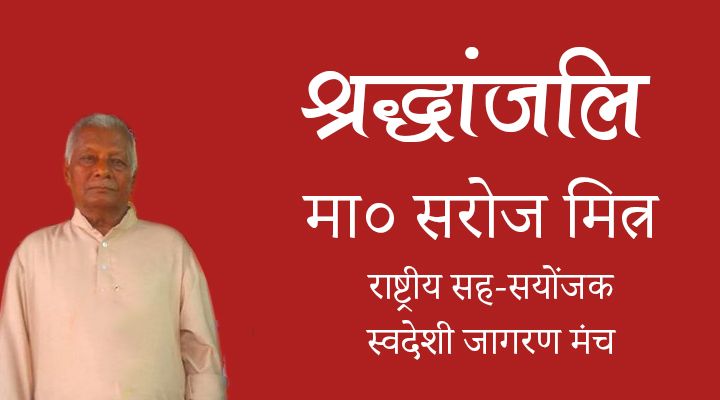“Dattopant is our thought giver,”remarked second R S S sarsanghachalak Shri Guruji Golwalkar at Thane meeting of the RSS held at Twatta Gyana Vidya Peeth of Pandurang Shashtri Athawale in 1972. The call of Thengadiji, the founder of Bharatiya Mazdoor Sangh (BMS), at the meeting was: “Nationalise the Labour, Labourise the Industry and Industrialise the Nation”. His clarion call was: “Workers unite the world” instead of ‘workers of the world unite’, a Marxist slogan. Indian ethos and cultural moorings found expression in Thengadiji’s exhortations in Indian trade union movement so far dominated by the leftists. Today, the BMS is the largest trade union in India.Presenting the Framework The socio-economic structure of the West, including its thought processes as well as the Hindu concept of development delineated by Shri Guruji Golwalkar at Thane meet in his discourses, continued for five long days. Finally, Shri Guruji asked for preparing a strategy for sustainable development of India. Further, he opined that manifestos must be such that country would follow it for years together while people restore confidence in it. Accordingly, Thengadi ji presented a framework on the basis of those enunciations made by Shri Guruji at Thane. A year later, Thengadi ji endorsed the views that “Westernisation is not modernisation and western paradigms are not universal paradigms”. More specific recommendations were made by Thengadi ji on the Western market economy. He opposed stock exchange, speculative trade practices like derivative trade, forward trading, currency market, etc., which are responsible for artificial price rise and contrived scarcities. To download Integral Humanism of Deendayal Upadhyaya one has to follow Dattopant Thengadi. Works of Guruji Golwalkar, Deendayal Upadhyaya and Dattopant Thengadi move in same wavelength without any contradiction.
Communism in Reverse Gear
Dattopant Thengadi, being a member of Parliamentary delegation led by Lok Sabha Speaker Sanjeev Reddy, visited Soviet Russia in 1968. After returning from Russia, he declared that communism was in reverse gear in Russia. Later on, despite CPM government ruling West Bengal, he maintained that time was running against communism, which was a historical fact. Thengadi ji held that blueprint should not be prepared without coming into power or nearing implementation stage. He cited most interesting and revealing instance of Savarkar seeking blueprint from Lenin. Lenin declined the offer since his blueprint for Russia could not be used for India.
Emergency of 1975
Before his arrest, Jaiprakash Narayan created Lok Sangharsh Samiti with Nanaji Deshmukh as its convenor to fight against Emergency in 1975. After Nanaji’s arrest, Dattopant Thengadi, after resigning from BMS, took charge of Lok Sangharsh Samiti. Though police were in search of him Thengadi ji reached Kolkata on September 9, 1975, as part of his all India tour. In a closed-door secret meeting at night with Thengadi ji, we discussed the prevailing situation in West Bengal and Odisha. There was fear everywhere and Smt Indira Gandhi was drawing huge crowds in her public meetings. After hearing all these from us, Thengadi ji with much confidence told us that Indira Gandhi’s regime would come to grinding halt within 17 months. “Is it astrology, I asked? No, said Thengadi ji”.Further he told that Indira Gandhi lacked the attributes of a dictator and “she believes none and no one trusts her”. Thus she would fail.” After my return from Kolkata, I was arrested under Maintenance of Internal Security Act at Cuttack and was released 17 months later in 1977 when Emergency was lifted. During Emergency days, Thengadi ji moved throughout India with Ravindra Verma and met political leaders and Jaiprakash Narayan at Jaslok Hospital in Mumbai. The story of Thengadi ji’s adventure during Emergency is yet to be published. Being frustrated due to continuation of Emergency some activists, particularly Baikunth Lal Sharma ‘Prem’ of Delhi who later became MP, vehemently advocated for resorting to violence to overthrow dictatorial regime of Indira Gandhi. Thengadi ji rejected the idea and presented a document titled, “On Revolution”. This document described violent movements held in different countries and its consequences. Finally, Thengadi ji emphasised that peaceful mass agitation become successful in a democracy. Though agitation against Emergency remained non-violent political interests came in its way. In 1976, JP’s health deteriorated and he asked Thengadi ji to propose somebody as his successor. Thengadi ji proposed the name of S.M. Joshi, a veteran Socialist leader of Pune. Some days later, Charan Singh met J.P. and asked him to name his successor. Thereafter, Charan Singh came out with public statement that Jana Sangh was against him. Such statement created misunderstanding at that juncture. Though he was under police surveillance, Thengadi ji undertook the arduous journey from Mumbai to Baghpat in UP to meet Charan Singh. Thengadi ji explained to Charan Singh that he proposed the name of Joshi since JP was likely to announce his successor to follow him by remaining out of power politics. Before Thengadiji could speak more Charan Singh embraced Thengadiji and told him that he was like his younger brother. Such episodesm were in plenty, which Thengadi ji encountered to bring political leaders together. Once, Indira Gandhi was defeated, Emergency was lifted and Janata Party came into existence Dattopant’s mission concluded. During his second tenure in Rajya Sabha (1970-76) Thangadi ji was invited for tea at Indira Gandhi’s residence, where he was asked between Jana Sangh and Golwalkar whom he represented? “Golwalkar”, replied Thengadiji. Though he was offered Dy Chairman Post in Rajya Sabha, he politely declined the offer.
